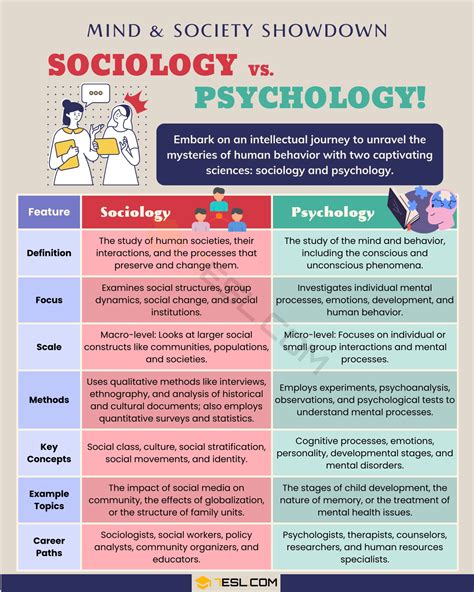Introduction

The multifaceted realms of sociology and psychology, while interconnected, offer unique perspectives on human behavior and social dynamics. Understanding the distinctions between these disciplines empowers us to comprehend the diverse approaches they employ in exploring the complexities of human existence.
Sociology: Unveiling the Interplay of Society and Individuals
Sociology focuses on the social structures, institutions, and cultural forces that shape individual behaviors and societal outcomes. Sociologists investigate:
- Social Interactions: How individuals behave within social groups and the dynamics that govern their interactions.
- Social Norms: The unwritten rules and expectations that influence individual choices and behaviors within a society.
- Social Stratification: The unequal distribution of power, resources, and opportunities based on factors such as social class, race, gender, and ethnicity.
- Socialization: The process by which individuals learn and internalize the values, beliefs, and behaviors of their society.
According to the American Sociological Association, sociology has experienced significant growth in recent years, with an estimated 15,000 sociologists employed in academia, research institutions, and government agencies in the United States alone.
Psychology: Exploring the Mind and Individual Experiences
Psychology delves into the inner workings of the human mind, examining thoughts, emotions, and behavior. Psychologists study:
- Cognitive Processes: The mental processes involved in thinking, problem-solving, and learning.
- Emotional Intelligence: The ability to recognize, understand, and manage one’s own and others’ emotions.
- Behavior: Patterns of observable actions and reactions, including both conscious choices and unconscious impulses.
- Personality: The unique traits and characteristics that distinguish individuals.
The American Psychological Association estimates that there are approximately 130,000 psychologists in the United States, working in diverse settings such as therapy, research, and consulting.
Key Differences: Bridging the Divide
While both sociology and psychology explore aspects of human experiences, their primary emphases differ significantly:
- Unit of Analysis: Sociology focuses on the social system as a whole, while psychology focuses on the individual.
- Research Methods: Sociologists emphasize qualitative and quantitative research methods, while psychologists employ clinical, experimental, and observational methods.
- Theoretical Approaches: Sociology draws from structural-functionalism, conflict theory, and symbolic interactionism; psychology utilizes psychodynamic, behavioral, cognitive, and humanistic theories.
- Goals: Sociologists aim to understand social phenomena, while psychologists seek to understand mental processes and behavior.
Interdisciplinary Synergies: A Tapestry of Insights
Despite their differences, sociology and psychology complement each other, offering holistic insights into human behavior. For example, sociological studies on social stratification can inform psychological research on the impact of poverty on mental health.
Application in Real-World Settings: Shaping Human Experiences
The knowledge gained from sociology and psychology has far-reaching implications for society, helping us:
- Design Public Policies: Understanding social dynamics and individual needs enables policymakers to create effective policies that address social issues.
- Improve Education: Insights into cognitive processes and social interactions inform teaching methods and curriculum development to enhance student learning.
- Promote Mental Health: Psychological research provides tools and techniques for diagnosing and treating mental disorders, improving the overall well-being of individuals and communities.
- Facilitate Workplace Success: Knowledge of human behavior and social dynamics aids organizations in fostering positive work environments and enhancing employee satisfaction.
Tables: Illuminating the Distinctions
Table 1: Unit of Analysis
| Discipline | Unit of Analysis |
|---|---|
| Sociology | Social system |
| Psychology | Individual |
Table 2: Research Methods
| Discipline | Qualitative Methods | Quantitative Methods | Clinical Methods | Experimental Methods | Observational Methods |
|---|---|---|---|---|---|
| Sociology | Focus groups, interviews | Surveys, statistical analysis | NA | NA | Participant observation |
| Psychology | Case studies, qualitative interviews | Psychometric tests, questionnaires | Psychotherapy, counseling | Lab experiments | Field experiments |
Table 3: Theoretical Approaches
| Discipline | Structural-Functionalism | Conflict Theory | Symbolic Interactionism | Psychodynamic | Behavioral | Cognitive | Humanistic |
|---|---|---|---|---|---|---|---|
| Sociology | Emphasizes stability and cohesion in society | Focuses on power imbalances and social inequality | Views society as a collection of subjective meanings | Explores unconscious motivations and conflicts | Emphasizes observable behavior and conditioned responses | Investigates mental processes and information processing | Values free will and personal growth |
Table 4: Applications
| Discipline | Application |
|---|---|
| Sociology | Public policy, education, social welfare |
| Psychology | Mental health, workplace productivity, education |
Tips and Tricks: Navigating the Differences
- Consider the Research Question: Identify whether your inquiry focuses on societal factors or individual experiences to determine the appropriate discipline.
- Review Scholarly Literature: Familiarize yourself with the theories, methods, and findings in both sociology and psychology to gain a comprehensive understanding.
- Seek Interdisciplinary Collaborations: Engage with researchers from both fields to combine perspectives and enhance your analysis.
- Embrace a Holistic Approach: Recognize the interconnectedness of social structures and individual psychology for a deeper understanding of human behavior.
Conclusion: Uniting the Social and Psychological Tapestry
Sociology and psychology offer distinct lenses through which we can examine the intricate tapestry of human existence. By appreciating their differences and exploring their synergies, we gain a profound understanding of the complex forces that shape our behaviors, interactions, and societies. This knowledge empowers us to create a more just, equitable, and fulfilling world for generations to come.
